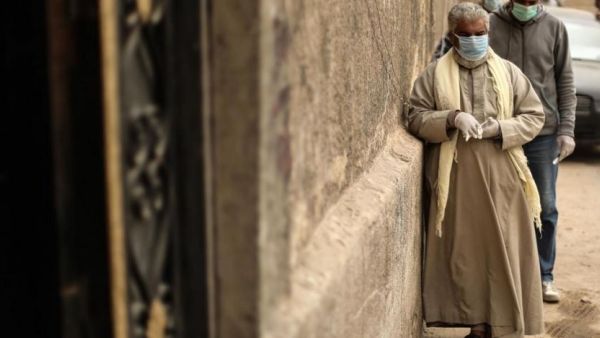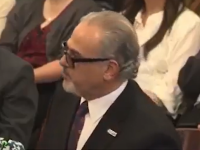Egypt has been suppressing journalists and is suspected of having been involved in creating fake social media accounts in order to spread false information. This has been done by evicting and threatening foreign journalists, and shutting down or suspending news organizations and social media feeds.
On the 19 March Egyptian security forces arrested the novelist Ahdaf Soueif and three other women for protesting for the release of prisoners who are at a high risk of contracting the coronavirus. The novelist was joined by her sister Laila Soueif, the activist Mona Seif and Rabab El-Mahdi, a political science professor. The group is also related to the blogger Alaa Abd El Fattah who is currently in prison for staging protests last year.
On the 25 March the Egyptian authorities revoked the press credentials of The Guardian journalist Ruth Michaelson who has now left the country. Similar threats were made to a New York Times journalist, who subsequently deleted tweets that commented on Michaelson’s article. Both foreign journalists had reported that the true number of COVID-19 cases was much higher than the government was reporting.
On the 25 March the Egyptian authorities revoked the press credentials of The Guardian journalist Ruth Michaelson who has now left the country. Similar threats were made to a New York Times journalist, who subsequently deleted tweets that commented on Michaelson’s article
Most recently, the general prosecution in Egypt has declared that those spreading fake news and rumors about coronavirus could face up to 5 years in prison or a fine of up to $1,200. These laws also apply, said the prosecution, to those spreading rumors and those attempting to spread panic around the virus. The prosecution finished by asking citizens to check the authenticity of online news reports.
Meera Selva from the Reuters Institute for the Study of Journalism at Oxford University told Al Bawaba that “part of the legislation has been harsh punishment for spreading, what’s called, false information. And of course, in this climate, it’s very hard to know who’s going to define what false information. Let’s assume it’s the government or police authorities. And because there is emergency legislation in place it’s very hard to appeal.”
...it’s very hard to know who’s going to define what false information. Let’s assume it’s the government or police authorities. And because there is emergency legislation in place it’s very hard to appeal.”
There is much irony in Egyptian authorities asking its citizens to keep a discerning eye on social media stories. Last week a white paper published by the Stanford Internet Observatory detailed suspected state-backed fake Twitter accounts which had been run out of Egypt. The accounts have now been taken down by Twitter as part of their ongoing “work to detect and investigate state-backed information operations,” as Yoel Roth, the man in charge of Twitter’s integrity.
Many of these fake accounts presented themselves as news organizations. Several were legitimate news organizations, such as El Fagr. The takedown of content originating from El Fagr alone consisted of 2,541 accounts and almost 8 million tweets. Many of the accounts took the names of real news outlets such as Fox News (@Foxnewseurope_f) with no actual affiliation.
Last week a white paper published by the Stanford Internet Observatory detailed suspected state-backed fake Twitter accounts which had been run out of Egypt
Some of these accounts were used to amplify the reach of El Fagr’s editor, Mostafa Thabet. Whilst other provided links to other content. Much of the content was highly critical, to the point of sensationalist, of Qatar, Turkey, Iran. Again, there is nothing singular to Egypt having editors who comply with their governments. In India, Narendra Modi asked editors to print positive stories on COVID-19, many of whom complied.
A new online campaign has been launched against The Guardian and is centered around the hashtag “lies of the Guardian” in Arabic, which eventually trended in Egypt. Other posts accused the newspaper of being funded by “terrorist Qatar.” Thus, the campaign drew a connection between COVID-19 – the claim that the newspaper lied when reporting the virus cases could be higher than official counts – and Qatar. It is not known whether this campaign originates from the government.
A new online campaign has been launched against The Guardian and is centered around the hashtag “lies of the Guardian” in Arabic, which eventually trended in Egypt.
According to Meera Selva the suspicion of foreign media outlets attempting to cause trouble in nation-states is not new: “Journalists as foreign agents who are trying to destabilize or undermine national regimes is not new as an idea, but COVID is raising it up again as a topic. Deep suspicion of foreigners reporting on national events and national pandemics.”
This re-hashing of old woes is not only found with Egypt’s ongoing anti-Qatari rhetoric. Meera Selva says that “it’s a global pandemic but all the reporting has taken in a very national tone. All the reporting has focused on its borders, how much debt it has, how it’s fairing in comparison with other countries. “
Egypt would not be the first country to use the virus to further an existing political agenda. In India, a social media campaign has gained momentum under the hashtag #CoronaJihad to blame Muslims for intentionally spreading the virus. Likewise, in many countries in Europe and Asia laws have been bought into place to bolster authoritarian regimes. China, for instance, has expanded is already considerable surveillance capabilities.
The UN Special Rapporteur on minority issues has warned that “politicians and groups are exploiting fears surrounding the disease to scapegoat certain communities, leading to a rise in violence against them.” In Egypt, it seems that the battle to control the narrative has bought in other conflicts too.
The UN Special Rapporteur on minority issues has warned that “politicians and groups are exploiting fears surrounding the disease to scapegoat certain communities
But perhaps the most urgent problem with censorship is to do with the ongoing COVID-19 crisis. Accurate information is needed to ensure that people behave in ways that best enhance their chances of survival. Populations need to know if health systems are being run properly.
Kenneth Roth, the executive director of Human Rights Watch, has told The New York Times that “germs don’t respect censorship... The censorship might stop the momentary criticism, but it could fuel the public health crisis.” Censorship coupled with false information campaigns on other issues in Egypt could cause many woes for the country post-COVID-19.
The views expressed in this article do not necessarily reflect those of Al Bawaba News.







